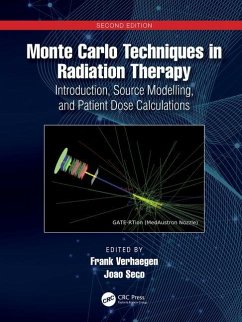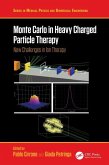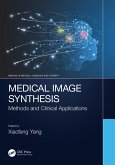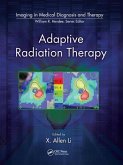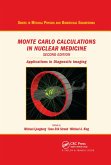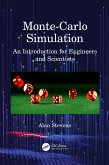Monte Carlo Techniques in Radiation Therapy
Introduction, Source Modelling, and Patient Dose Calculations
Herausgeber: Verhaegen, Frank; Seco, Joao
Monte Carlo Techniques in Radiation Therapy
Introduction, Source Modelling, and Patient Dose Calculations
Herausgeber: Verhaegen, Frank; Seco, Joao
- Gebundenes Buch
- Merkliste
- Auf die Merkliste
- Bewerten Bewerten
- Teilen
- Produkt teilen
- Produkterinnerung
- Produkterinnerung
About ten years after the first edition comes this second edition of Monte Carlo Techniques in Radiation Therapy: Introduction, source modelling and patient dose calculations, thoroughly updated and extended with the latest topics, edited by Frank Verhaegen and Joao Seco.
Andere Kunden interessierten sich auch für
![Monte Carlo in Heavy Charged Particle Therapy Monte Carlo in Heavy Charged Particle Therapy]() Monte Carlo in Heavy Charged Particle Therapy178,99 €
Monte Carlo in Heavy Charged Particle Therapy178,99 €![Medical Image Synthesis Medical Image Synthesis]() Medical Image Synthesis109,99 €
Medical Image Synthesis109,99 €![Proton Therapy Physics, Second Edition Proton Therapy Physics, Second Edition]() Proton Therapy Physics, Second Edition179,99 €
Proton Therapy Physics, Second Edition179,99 €![Adaptive Radiation Therapy Adaptive Radiation Therapy]() Adaptive Radiation Therapy63,99 €
Adaptive Radiation Therapy63,99 €![Monte Carlo Simulation with Applications to Finance Monte Carlo Simulation with Applications to Finance]() Hui WangMonte Carlo Simulation with Applications to Finance261,99 €
Hui WangMonte Carlo Simulation with Applications to Finance261,99 €![Monte Carlo Calculations in Nuclear Medicine Monte Carlo Calculations in Nuclear Medicine]() Monte Carlo Calculations in Nuclear Medicine58,99 €
Monte Carlo Calculations in Nuclear Medicine58,99 €![Monte-Carlo Simulation Monte-Carlo Simulation]() Alan StevensMonte-Carlo Simulation113,99 €
Alan StevensMonte-Carlo Simulation113,99 €-
-
-
About ten years after the first edition comes this second edition of Monte Carlo Techniques in Radiation Therapy: Introduction, source modelling and patient dose calculations, thoroughly updated and extended with the latest topics, edited by Frank Verhaegen and Joao Seco.
Hinweis: Dieser Artikel kann nur an eine deutsche Lieferadresse ausgeliefert werden.
Hinweis: Dieser Artikel kann nur an eine deutsche Lieferadresse ausgeliefert werden.
Produktdetails
- Produktdetails
- Imaging in Medical Diagnosis and Therapy
- Verlag: Taylor & Francis Ltd
- 2 ed
- Seitenzahl: 266
- Erscheinungstermin: 3. Dezember 2021
- Englisch
- Abmessung: 214mm x 286mm x 26mm
- Gewicht: 904g
- ISBN-13: 9781032078526
- ISBN-10: 1032078529
- Artikelnr.: 62224921
- Herstellerkennzeichnung
- Libri GmbH
- Europaallee 1
- 36244 Bad Hersfeld
- gpsr@libri.de
- Imaging in Medical Diagnosis and Therapy
- Verlag: Taylor & Francis Ltd
- 2 ed
- Seitenzahl: 266
- Erscheinungstermin: 3. Dezember 2021
- Englisch
- Abmessung: 214mm x 286mm x 26mm
- Gewicht: 904g
- ISBN-13: 9781032078526
- ISBN-10: 1032078529
- Artikelnr.: 62224921
- Herstellerkennzeichnung
- Libri GmbH
- Europaallee 1
- 36244 Bad Hersfeld
- gpsr@libri.de
Frank Verhaegen is Head of Clinical Physics Research at the MAASTRO Clinic in Maastricht, the Netherlands. He holds a professorship from the University of Maastricht. Formerly, he held an Associate Professorship at McGill University in Montreal, Canada. He earned his PhD from the University of Ghent in Belgium in 1996. He held research positions at the Royal Marsden Hospital and the National Physical Laboratory (UK) for several years. Dr Verhaegen is a Fellow of the Institute of Physics and Engineering in Medicine and the Institute of Physics. His group has published about 250 research papers, a significant fraction of them about Monte Carlo modelling. His interests range broadly in imaging and dosimetry for photon, proton and electron therapy, brachytherapy and small animal radiotherapy. He also founded a company that offers Monte Carlo-based treatment planning for preclinical precision radiation research. Dr Verhaegen has been passionate about Monte Carlo simulations since the days of his Masters thesis in the late eighties. Joao Seco graduated with a PhD from the University of London, at the Institute of Cancer Research (ICR) and Royal Marsden Hospital in London, UK. He then went on to become an Assistant Professor of Radiation Oncology at Harvard Medical School in Boston, working at the Massachusetts General Hospital (MGH). He then returned to Europe to work at the German Cancer Research Center, DKFZ in Heidelberg, heading up a new group dedicated to ion beam research and with the focus on 1) novel imaging technologies to reduce Bragg peak positioning errors in patients and 2) on investigating the mechanism of radiation triggered DNA damage via reactive oxygen species. He is also presently the Chair of Medical Physics at the Department of Physics and Astronomy, Heidelberg University and is a member of the EFOMP Scientific Committee, representing the DGMP, German Society for Medical Physics.
1.History of Monte Carlo.2. Basics of Monte Carlo Simulations. 3. Variance
Reduction Techniques 4. Monte Carlo Modelling of External Photon Beams in
Radiotherapy. 5. Monte Carlo Modelling of External Electron Beams in
Radiotherapy. 6. Monte Carlo techniques in brachytherapy: basics and source
and detector modelling. 7. Monte Carlo Modeling of Scanned Ion Beams in
Radiotherapy. 8. Monte Carlo simulations for Treatment Device Design. 9.
Dynamic Beam Delivery and 4D Monte Carlo. 10. Photons: Clinical
considerations and applications. 11. Patient Dose Calculation. 12.
Electrons: Clinical considerations and applications. 13. Protons: Clinical
considerations and applications. 14. Monte Carlo as a QA tool for advanced
radiation therapy. 15. Monte Carlo applications in total skin electron
therapy (TSET). 16. Monte Carlo simulation in brachytherapy patient and
applicator modelling. 17. Artificial intelligence and Monte Carlo
simulation.
Reduction Techniques 4. Monte Carlo Modelling of External Photon Beams in
Radiotherapy. 5. Monte Carlo Modelling of External Electron Beams in
Radiotherapy. 6. Monte Carlo techniques in brachytherapy: basics and source
and detector modelling. 7. Monte Carlo Modeling of Scanned Ion Beams in
Radiotherapy. 8. Monte Carlo simulations for Treatment Device Design. 9.
Dynamic Beam Delivery and 4D Monte Carlo. 10. Photons: Clinical
considerations and applications. 11. Patient Dose Calculation. 12.
Electrons: Clinical considerations and applications. 13. Protons: Clinical
considerations and applications. 14. Monte Carlo as a QA tool for advanced
radiation therapy. 15. Monte Carlo applications in total skin electron
therapy (TSET). 16. Monte Carlo simulation in brachytherapy patient and
applicator modelling. 17. Artificial intelligence and Monte Carlo
simulation.
1.History of Monte Carlo.2. Basics of Monte Carlo Simulations. 3. Variance
Reduction Techniques 4. Monte Carlo Modelling of External Photon Beams in
Radiotherapy. 5. Monte Carlo Modelling of External Electron Beams in
Radiotherapy. 6. Monte Carlo techniques in brachytherapy: basics and source
and detector modelling. 7. Monte Carlo Modeling of Scanned Ion Beams in
Radiotherapy. 8. Monte Carlo simulations for Treatment Device Design. 9.
Dynamic Beam Delivery and 4D Monte Carlo. 10. Photons: Clinical
considerations and applications. 11. Patient Dose Calculation. 12.
Electrons: Clinical considerations and applications. 13. Protons: Clinical
considerations and applications. 14. Monte Carlo as a QA tool for advanced
radiation therapy. 15. Monte Carlo applications in total skin electron
therapy (TSET). 16. Monte Carlo simulation in brachytherapy patient and
applicator modelling. 17. Artificial intelligence and Monte Carlo
simulation.
Reduction Techniques 4. Monte Carlo Modelling of External Photon Beams in
Radiotherapy. 5. Monte Carlo Modelling of External Electron Beams in
Radiotherapy. 6. Monte Carlo techniques in brachytherapy: basics and source
and detector modelling. 7. Monte Carlo Modeling of Scanned Ion Beams in
Radiotherapy. 8. Monte Carlo simulations for Treatment Device Design. 9.
Dynamic Beam Delivery and 4D Monte Carlo. 10. Photons: Clinical
considerations and applications. 11. Patient Dose Calculation. 12.
Electrons: Clinical considerations and applications. 13. Protons: Clinical
considerations and applications. 14. Monte Carlo as a QA tool for advanced
radiation therapy. 15. Monte Carlo applications in total skin electron
therapy (TSET). 16. Monte Carlo simulation in brachytherapy patient and
applicator modelling. 17. Artificial intelligence and Monte Carlo
simulation.

